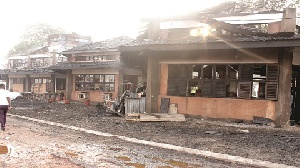Too many domestic accidents occasioned by liquefied petroleum gas (LPG) explosions have occurred in the past few months and unfortunately counting.
The statistics available to the Ghana National Fire Service (GNFS) might not capture all the instances of such fires, suffice it to point out, however, that many deaths and permanent deformities of victims have been recorded.
Following the introduction of the LPG when the campaign to conserve our forest resources was at its peak, many Ghanaians were won over to the use of what stands out to be the most convenient source of energy for cooking yet.
Unfortunately, however, there has not been an accompanying systematic education on how to ensure safety in the use of the LPG.
Many more persons are using LPG in cooking than was the case a little over a decade ago, reality which calls for the engagement of women, especially on how to avoid the accidents which come with the reckless use of the facility.
In most cases of LPG explosions, users have showed stark ignorance of how to detect leakage of gas in the cylinders containing the energy source.
It is this ignorance which has led to many users painting rusty cylinders, thinking erroneously that this renews the lives of the containers only for these to turn out as death traps.
Petty thieves within neighbourhoods who prey on LPG cylinders have compelled users to keep these containers in confinements such as kitchens or even bedrooms, which double as cooking points.
Under such situations, leakages are mostly not even detected until there is explosion and fire. We have learnt about how many of the cases at the Burns Centre at the Korle Bu Teaching Hospital originate from LPG explosions regrettably.
It is sad that women who bear the brunt of most of these avoidable accidents serve as important pivots in families, their roles not adequately appreciated, especially in conservative communities.
We call on the relevant authorities such as the Ghana National Fire Service (GNFS), especially civil society bodies, to respond to the menace caused by the inappropriate use of LPG by ignorant women and others.
We also suggest that LPG vending points be equipped with the appropriate education about the safety of the energy source so that this can be imparted to persons, especially women who come to refill their cylinders.
It would also be a good idea when attendants at LPG sales points are empowered to deny refilling cylinders whose integrity are questionable, and to advise such customers about the dangers posed by the containers in their sorry state.
Landlords should insist that tenants keep their LPG cylinders outside and not within kitchens or bedrooms or halls.
Children should be sensitized on the dangers of leaking cylinders and the best practices in the use of such facilities.
Regional News of Saturday, 11 February 2017
Source: dailyguideafrica.com

















